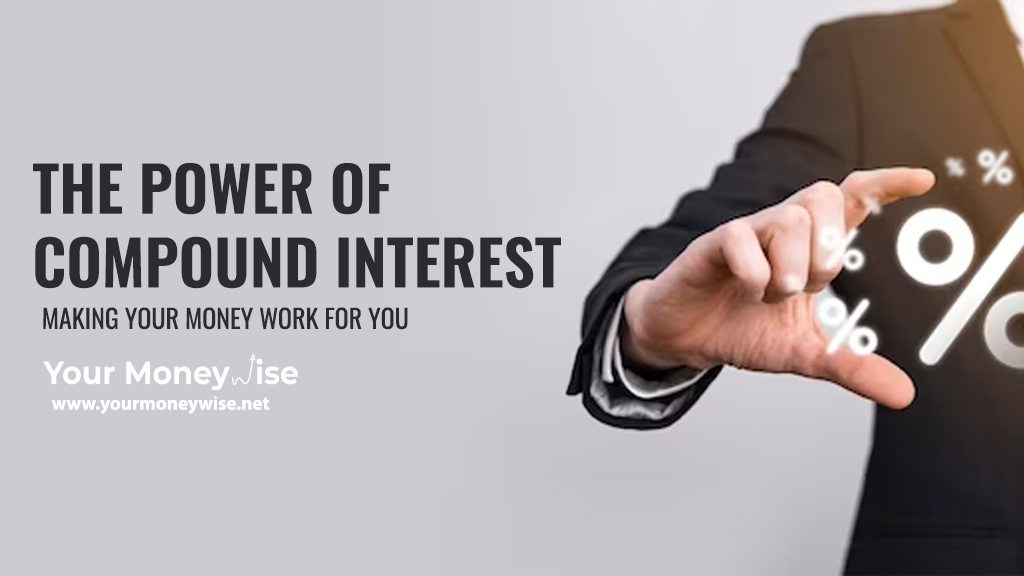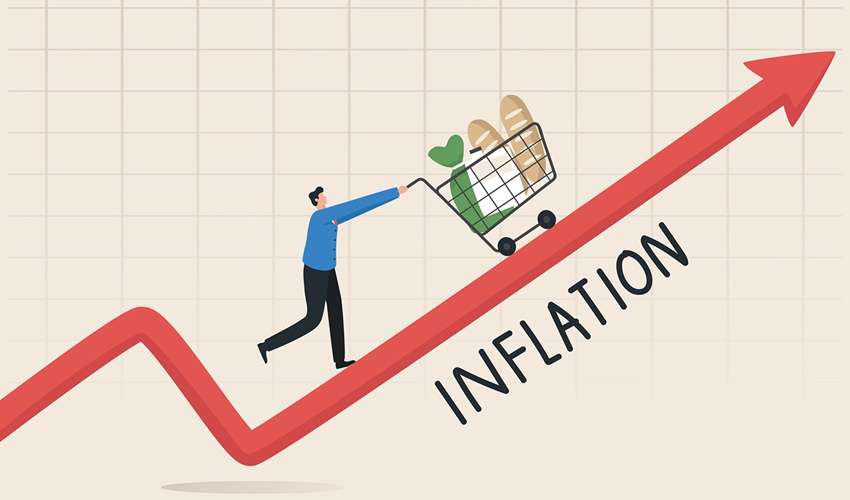Ever wished you were saving more money for the future? Or are you concerned that you may run out of money? Knowing how to put your money to work for you can help you achieve both of these goals. Even if you start little, you may still hope to accomplish enough over time. How does this all come about?
Your regular activities also have a cumulative impact, whether it be through yoga, reading, meditation, or any other activity.
The following day, you expand on what you accomplished today. The next day, you may start marginally better than you did the day before—possibly so slightly that you can't even notice. The effects can be enormous when these increments are compounded together over time.
Compounding is the process through which earnings, such as interest or profits, are reinvested to produce more earnings over time. Where does this extraordinary compounding ability come from? It is now. The more income or profits you may make on your investment, the longer you retain it. Your financial situation might expand enormously with compounding over time. Investing doesn't need riches, but the power of compounding can make you rich. Are you wondering about how to calculate compound interest, this post is for you. We cover all the important things below.
Understanding Compound Interest
Compound interest is the process of reinvesting earnings, such as interest or profits, to generate additional earnings over time. It involves the compounding effect, where the payments from your initial investment are added to the principal, and future earnings are calculated based on the increased total amount. Because of this compounding impact, your savings might grow at an exponential rate.
How much interest you end up with after compounding depends heavily on how often those periods occur. Imagine it like a snowball sliding down a hill. The earlier you start saving and the more money you add to your savings, the larger the snowball becomes. As the snowball rolls, the snow it has already collected sticks, and it accumulates even more snow along the way. When it reaches the bottom of the hill, it contains the original snow, the snow it picked up, and additional snow on top of that.
In essence, compound interest allows for continuous growth of returns based on your initial investment. By saving more frequently and increasing the amount you save, you can earn larger amounts of interest. This phenomenon is often referred to as "the miracle of what is compound interest."
Why is compound interest important?
It accelerates the growth of your wealth. Compared to simple interest, compound interest enables your money to grow at a faster rate because you earn returns not only on the initial investment but also on the accumulated returns in each compounding period. As a result, you don't need to save as much money to reach your financial goals.
The Magic of Compounding
The true power of compounding lies in time. The longer you keep your investment, the more time it has to accumulate interest or generate profits. Small increments added consistently over time can result in significant financial growth. Just like daily activities that compound and lead to personal development, your investments can compound and lead to wealth accumulation.
The power of compounding refers to the practice of earning interest on both the initial principal amount and the accumulated earnings from previous compounding periods. It enables your wealth to grow over time.
Various banks and financial institutions offer investment options that utilize compound interest. These investment plans allow you to take advantage of compounding based on your needs because they include specified compounding periods, such as annual, monthly, or even daily.
So, how does the power of compounding work? Different investment vehicles, like fixed deposits and mutual funds, reinvest your earnings from interest or capital gains to generate additional earnings. Consider that after 5 years, your initial investment of Rs. 5 lakhs would have grown to Rs. 5.80 lakhs if you put away Rs. 1 lakh every year in a plan that gives 5% compounding interest. An increase in return to 8% would mean that the value in the future may be as high as Rs. 6.34 lakhs. To explore various investment periods and interest rates, you can use a power compound interest calculator provided by Max Life Insurance.
Now, how long should you invest to maximize the benefits of compounding? The beauty of compounding lies in its ability to reinvest earnings on your investment. It is crucial not to withdraw your returns before the investment period concludes, as doing so would limit the growth potential of your profits through compounding. The choice of investment plan and period should align with your financial goals and investment capacity. The longer your investment horizon, the earlier you should start investing to allow ample time for the desired wealth accumulation.
Remember, the power of compounding is a valuable tool for wealth creation, and by staying invested and reinvesting your earnings, you can harness its full potential.
Example of Compounding in Action
Let's consider an example to illustrate how compound interest works. Suppose you invest Rs 10,000 in a bank deposit that offers a 10% annual return rate. At the end of the first year, you would have a total investment of Rs 11,000, with Rs 1,000 in interest added to the principal amount. The primary of Rs 11,000 will increase by 10% in the second year, turning into a gain of Rs 1,100. This brings the total to Rs 12,100. As time goes on, both the principal and the interest earned continue to increase, compounding your wealth.
Leveraging the Power of Compounding
To make the most of compound interest, here are some crucial considerations to keep in mind:
Start Investing Early for Maximum Compounding Benefits
To fully capitalize on the power of compounding, beginning your investment journey early is crucial. By initiating investments as soon as you start earning, you give your savings a significant opportunity to grow over time, courtesy of compounding.
Simultaneously, the longer you stay invested without withdrawing your returns, the more your money can grow exponentially due to the compounding effect gaining momentum over time.
Let's consider an example to illustrate the power of compounding: The ages of Ajay and Deepak are identical. When Ajay was 25 years old, he put Rs. 50,000 into an investment that promised an annual compound return of 6%. Ajay's original investment will have increased to Rs. 1.07 lakhs by the time he turns 40.
In contrast, Deepak started investing at the age of 35 with the same amount and return rate. When Deepak turned 40, he would have earned only Rs. 59.75 thousand. This exemplifies the impact of compounding.
Opt for Shorter Compounding Intervals for Greater Impact
Another source of its power is the consistency with which interest is compounded. Depending on the type of investment chosen, the frequency of compounding might be daily, monthly, quarterly, semiannually, or annually.
Shorter compounding intervals result in a more significant impact on your investments. Take the imagined scenario of Ramesh investing Rs. 10,000 across two distinct investment opportunities over the course of three years. The first option offers a 7% p.a. return compounded annually, while the second option offers the same return rate but compounded quarterly.
At the end of three years, the first option would be worth Rs. 12,250, while the second option would be worth Rs. 12,314. This demonstrates that shorter reinvestment intervals yield higher returns compared to longer intervals.
In summary, increasing the frequency of reinvestment enhances the difference in returns. Therefore, if you have a long investment horizon, investing in equities is advisable as it provides a better rate of return over an extended period. You can also utilize a power compound interest calculator from Max Life Insurance to explore how compounding can increase your returns based on different investment periods and interest rates.
Exercise Patience and Discipline
To build a robust and flourishing investment portfolio, defining your priorities and maintaining discipline in your investments is essential. It is crucial to leverage the power of compounding to maximize your investment potential. Regardless of your income level, allocating time to identify your goals and preferences is important. This enables you to understand and capitalize on the benefits of long-term regular investments and the role of compounding.
Simultaneously, avoid being tempted to make premature withdrawals that could jeopardize the growth potential of your funds.
Select the Right Investment Instruments
While you may not possess the expertise of a seasoned stock investor, it doesn't mean that the power of compounding is unavailable to you. Investing predominantly in stocks might pose challenges since they fall under the volatile asset class and offer no guaranteed returns.
However, equity investments have historically delivered better inflation-adjusted returns over the long term compared to other investment options and asset classes, thanks to the power of compounding. To mitigate risks, you can implement a stop-loss method to limit losses. Investment diversification across industries and market caps helps you take full advantage of compounding over time.
Explore Fixed Return Schemes
If you prefer lower-risk investments, there are opportunities to benefit from the power of compounding through fixed-return schemes.
Debt funds provide steady returns through investments in fixed-interest-generating securities such as corporate bonds, treasury bills, government securities, and commercial paper.
Another effective tool that makes use of compounding is the National Pension System (NPS). This is an excellent way to save for retirement since investments in stocks, term deposits, liquid funds, corporate bonds, and government funds grow over time.
The Senior Citizens' Savings Scheme (SCSS) and bank fixed deposits (FDs) are two more examples of long-term investment plans that assist people in building wealth through compounding over time. Calculate compound interest and know your profits.
Read Also:- Insure your Future: Exploring Various Types of Life Insurance
Fixed Formula - Compound Interest Calculation
The calculation of compound interest can also be done using a fixed formula.
The formula for compound interest is ((P*(1+i)^n) - P), where P represents the principal, I represents the annual interest rate, and n represents the number of periods.
To calculate compound interest follow these steps:
- Enter "Principal value" in cell A1 and input "1000" in cell B1.
- Enter "Interest rate" in cell A2 and input ".05" in cell B2.
- Enter "Compound periods" in cell A3 and input "5" in cell B3.
- Calculate the compound interest in cell B4 by entering the formula "=(B1*(1+B2)^B3)-B1". This will yield a value of $276.28.
By utilizing the compound interest formula, you can accurately calculate the compound interest based on the principal, interest rate, and number of periods.
Debt and compound interest
Finally, it's critical to think about how compound interest will affect your debt. Compound interest can be advantageous when investing, but it can also be detrimental if it builds up on the amount you owe. The consumer debt that has this detrimental effect is most frequently credit card debt.
When compared to other forms of debt, credit cards frequently have the highest interest rates, and if you find yourself drowning in them, they can cause serious financial hardship. The majority of credit card providers merely demand a minimum payment of 1% of your monthly debt. If you can't afford to pay more than the minimum, the hefty interest that builds up on the outstanding sum will rapidly send you into a debt cycle that is hard to escape.
Therefore, if at all feasible, try to stay away from credit card debt. You must have confidence in your spending patterns and make sure you can afford to pay off your credit card debt. Don't give up, though, if you're already in over your head with credit card debt. You have choices, such as creating a snowball or avalanche debt repayment strategy. Additionally, you may look at personal loans or balance transfer offers as options for refinancing or consolidating your credit card debt.
The Bottom Line
Compound interest's immense potential can greatly influence your financial development and aid in the accomplishment of your long-term objectives. You may take advantage of compounding's wealth-building potential by investing early, being disciplined, making investing a habit, and being patient. Compounding benefits are possible with a number of investment alternatives, including fixed-income and market-linked products. Keep in mind that compounding needs patience, persistence, and a long-term outlook. Let your money start working for you today.
FAQs
Compounding is a Mutual Funds method that entails reinvested interest on the principal sum. Compounding serves as a money multiplier by gaining interest on interest or profits on profits, increasing the value of the investment.
The potential growth of assets is one of the main advantages of compounding. A compounding effect is produced by reinvesting the interest or profits made on the principal, leading to the multiplication of the investment value as long as the money is kept invested. In order to gain from compounding, it is advised that:
To build a solid wealth foundation, start investing early.
Keep investing with discipline and regularity since consistent contributions help to build wealth.
Remember your long-term objectives and practice patience as the power of compounding gradually becomes apparent.
The interest that is computed and accrued on the initial deposit, including all previously earned interest, is known as compounding interest. It is comparable to receiving "interest on interest."
When it comes to compounding interest, it is generally more beneficial to compound it daily rather than monthly. Daily compounding means that the interest is calculated and added to the account on a daily basis, while monthly compounding involves the interest being added at the end of each month. Following the principle of compounding, shorter compounding intervals result in higher interest earnings. Therefore, compounding daily interest yields greater benefits compared to monthly compounding.









